The Google Pixel 4 XL Review: Stuck In The Past In 2019
by Andrei Frumusanu on November 8, 2019 11:30 AM EST- Posted in
- Mobile
- Smartphones
- Pixel 4
- Pixel 4 XL
System Performance
One aspect Google Pixel devices have always excelled at is performance. With every generation, Google had opted to customise the BSP stack and improve on Qualcomm’s mechanisms to be able to extract as much performance out of the SoC as possible. In recent years these customisations haven’t been quite as evident as QC’s schedulers became more complex and also more mature. The Pixel 4 again makes use of Qualcomm’s scheduler mechanisms instead of Google’s own Android Common Kernel. The Pixel 4 also arrives with Android Q which is one of the very few devices in our testbench which comes with the new OS version.
We’re testing the Pixel 4 at three refresh rate settings: the default 60Hz mode, the automatic 90Hz mode, and the forced 90Hz mode. As with the OnePlus 7 Pro earlier in the year, we’re expecting to measure differences between the different display modes.
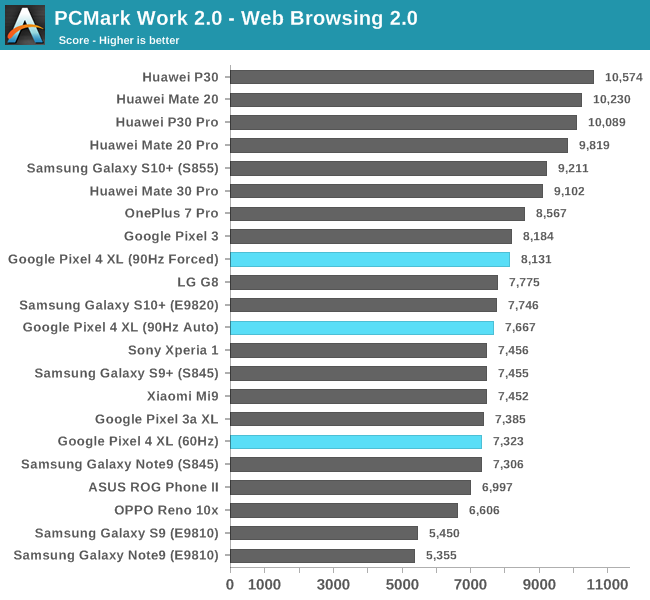
Starting off with the web browsing test, we’re seeing the Pixel 4 XL perform quite averagely. The odd thing here is that it’s showcasing worse performance and scaling than the Pixel 3 last year in all but the forced 90Hz mode. It’s also interesting to see how the forced 90Hz mode is able to post an advantage over the regular 90Hz mode even though the content of the benchmark doesn’t contain anything in particular that would have the automatic mode trigger to 60Hz.
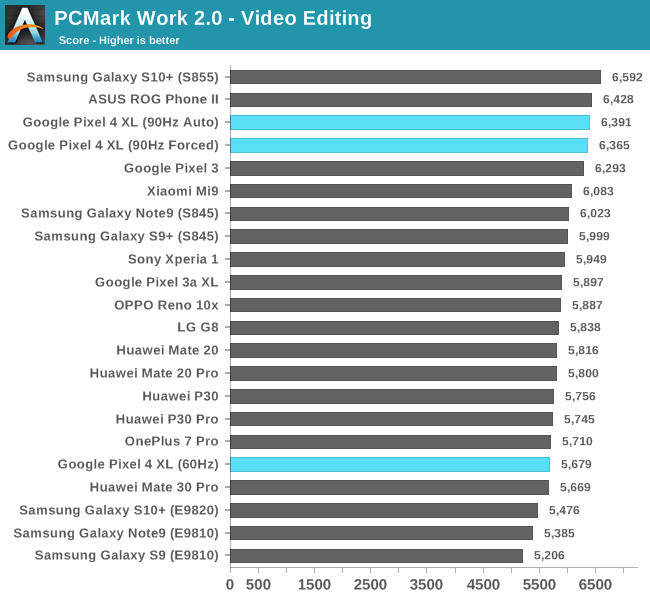
In the video editing test, which isn’t all that significant in terms of its results, we do however see the differences between the 60 and 90Hz modes. Again, it’s odd to see the 60Hz mode perform that much worse than the Pixel 3 in this test, pointing out to more conservative scaling of the little CPU cores.
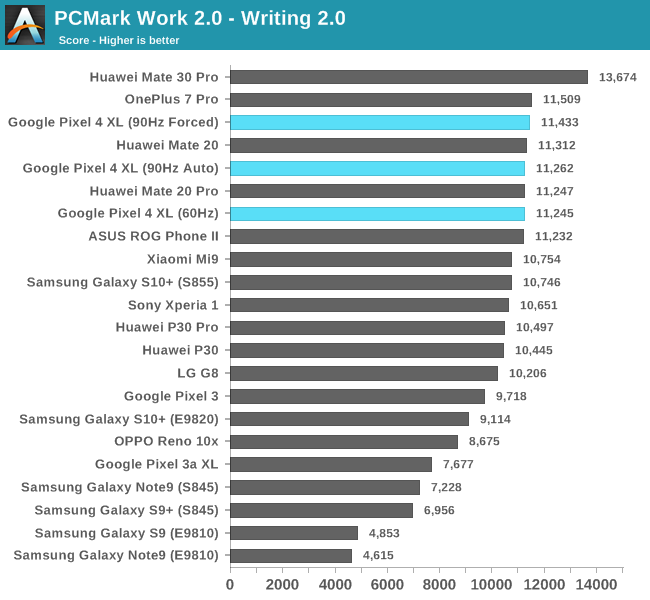
In the Writing test which is the most important sub-test of PCMark and has heavier workloads, we see the Pixel 4 perform very well and is in line with the better Snapdragon 855 devices out there.
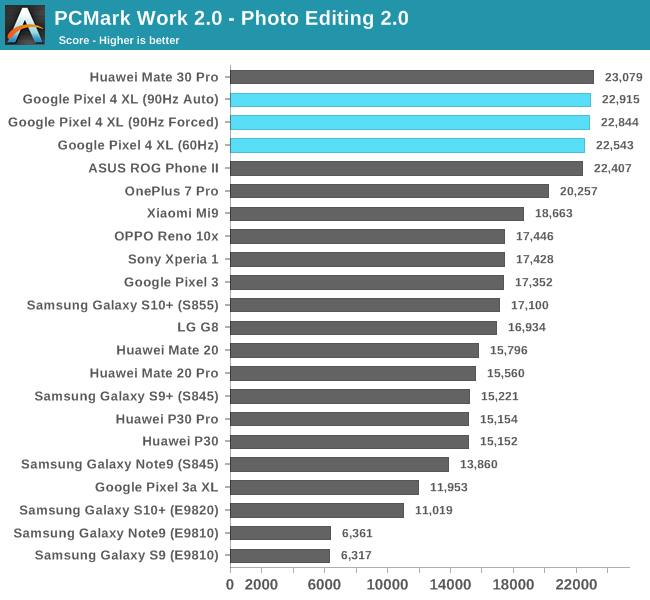
The Photo Editing scores of the Pixel 4 are also top notch and the best Snapdragon 855 device we have at hand.
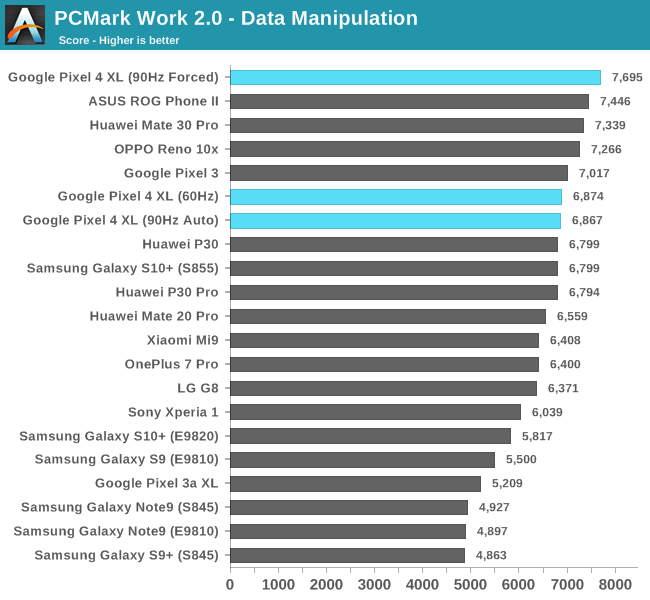
The data manipulation test is another odd one that I can’t really explain it performs better on the forced 90Hz mode over than the automatic 90Hz mode.
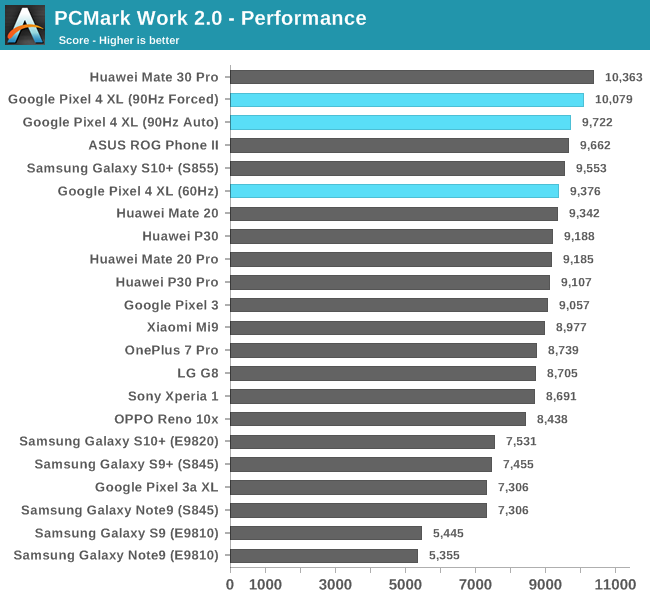
Finally, the Pixel 4 ends up high in the ranks in PCMark, really only trailing the Mate 30 Pro.
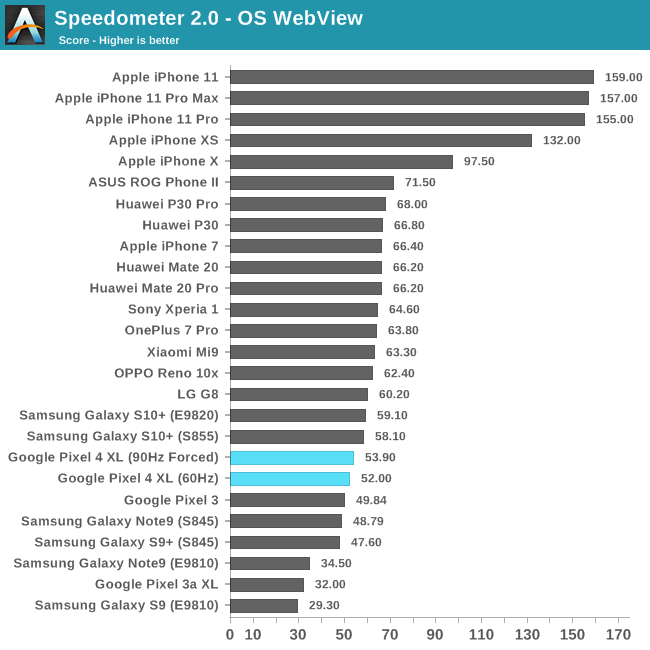
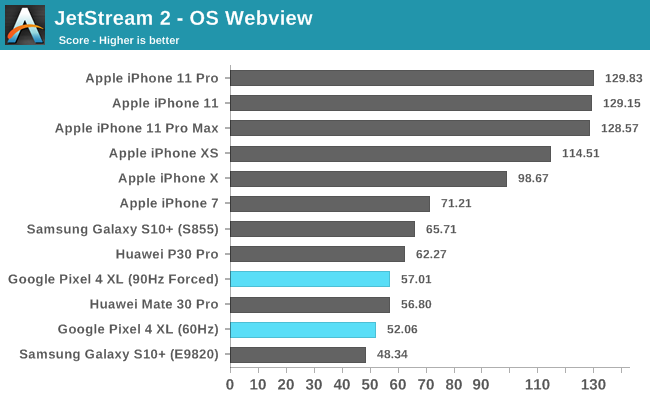
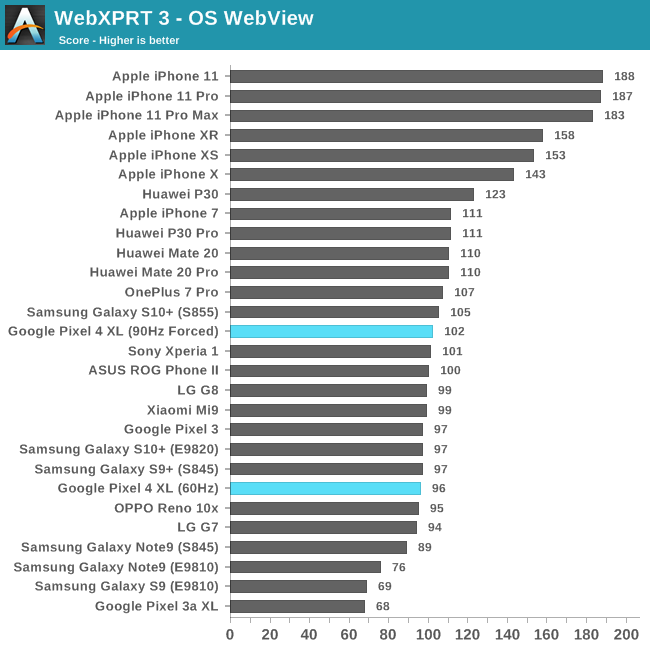
In the web benchmarks, the Pixel 4 performs quite average to actually quite bad, compared to what we’ve seen from other S855 phones. I’m really not sure why the degradation takes place, I’ll have to investigate this more once I have another S855 with Android Q.
Performance Conclusion
Overall, performance of the Pixel 4 is excellent, as expected. The big talking point here isn’t really the SoC or Google’s software, but rather the 90Hz screen of the phone. It really augments the experienced performance of the phone, making it stand out above other 60Hz phones this year.
That being said, unlike last year, I can’t say that the Pixel 4 is amongst the snappiest devices this year as that title was already taken by the new Huawei Mate 30 Pro with the newer generation Kirin 990. Unfortunately for Google, performance of the Pixel 4 will be a rather short-lived selling point as I expect the competition (which don’t already have the feature) to catch up with high refresh screens, and also surpass the Pixel as the new generation Snapdragon SoCs are just a month away from launch.










159 Comments
View All Comments
MaxUserName - Saturday, November 9, 2019 - link
You especially do not take pictures in very high-contrast scenes to hide the fact that the Google Camera does not work real HDR?swood15 - Saturday, November 9, 2019 - link
I was in the market for a new phone but wanted to wait for the Pixel 4 to drop before making a decision, ended up going with a OP7 Pro. Same SoC, 2x the RAM, 4x the storage, arguably a better implementation of the 90Hz display, larger battery, no forehead/notch, a respectable camera, and a clean OS for $50 cheaper than the cheapest Pixel 4?! Google needs to get serious.Bragabondio - Saturday, November 9, 2019 - link
Love Pixel devices as specs are not all. My feeling is that in the last few years phones are fast enough so specs in terms of pure speed are mostly meaningless unless you have some special case that I don have. Unlocked boot-loader, guaranteed fastest updates for 3 years and freedom to sideload apps is a big plus. Best camera on the market, IP68 dust and water resistance are also a must in my book and both Pixel 4 have them.I agree that the original price is to high ($799 for the regular version and $899 for the XL version) but with a recent $200 discount the new price is $599 for the regular version and $699 for the XL version making them much more reasonable buy.
I am personally skipping Pixel 4 as I plan to upgrade my Pixel 2 next year with Pixel 5.
Arbie - Saturday, November 9, 2019 - link
• No 3.5mm headphone jack.• No sale.
s.yu - Sunday, November 10, 2019 - link
I agree, not that the rest of this package would appeal to me if it even had the jack.For example:
• No 256GB+ storage.
• No sale.
Medstar1 - Sunday, November 10, 2019 - link
Interesting that the reviewer rigged Google for not introducing an ultra wide lens like their rivals; thus, ignoring the fact that LG introduced this feature several years ago.Andrei Frumusanu - Sunday, November 10, 2019 - link
What's your point? LG being first to the UWA doesn't change the fact that Google's the only vendor this year not having it.LG was first to it and I've always said it's a great addition to the camera experience, but it was Huawei in 2018 which popularised it as the UWA quality was far ahead of what LG was able to ever offer.
Oliseo - Sunday, November 10, 2019 - link
I would have said that the Pixels MAIN issue is the woefully short support timeframe from Google.3 years of support IS NOT ENOUGH for the price, regardless of anything else.
bengoey - Saturday, November 23, 2019 - link
Agree, my original 2016 Pixel won't have anymore updates from January 2020, so 3 years update only. If I bought an iPhone instead it will still have software update at least until the end of 2020, may be more. The camera of the Pixel however was better than iPhone at the time. Now iPhone 11 camera has improved and the video is better than the Pixel 4, if I am to upgrade I would buy the Iphone 11 , not the Pixel 4. To upgrade the memory to 128Gb will cost me £50 for the iphone 11 and £100 for the Pixel 4SirKronan - Sunday, November 10, 2019 - link
Yet another newly released phone with its full review complete, but still no word on the Note 10/10+ review?Is Anandtech not going to review the new Note phones after all? That would be a shame.